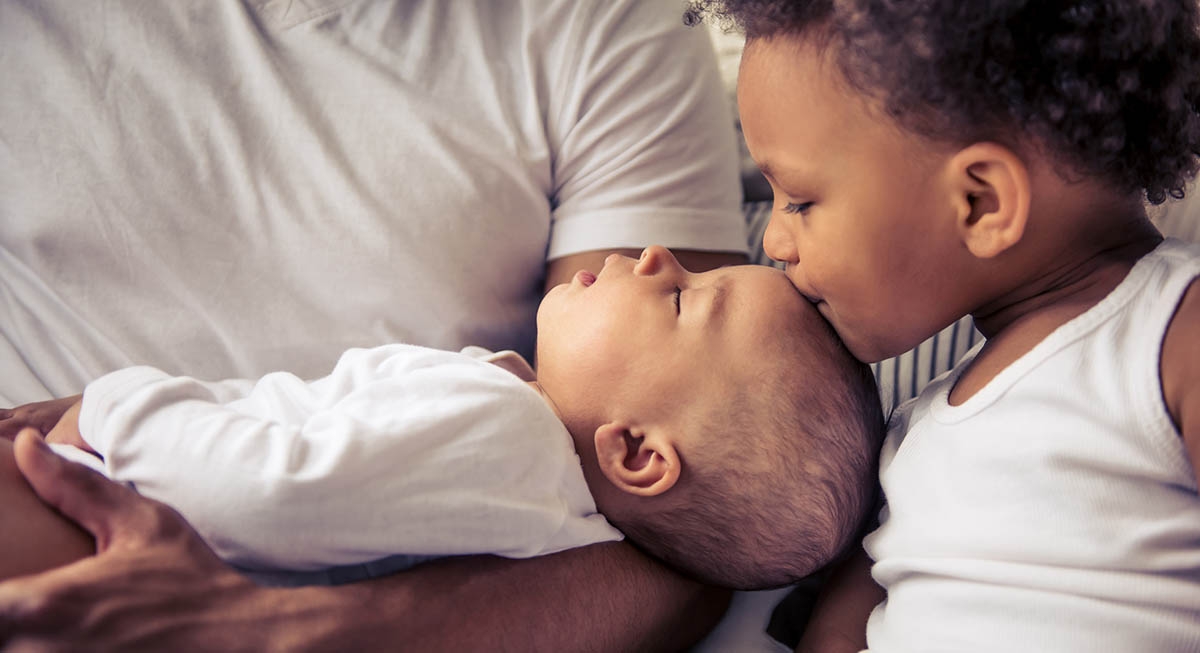
Understanding a firstborn’s behaviour when adjusting to the new baby
QUESTION
Dear Adele,
My husband and I will be welcoming a new baby to our family next month. We currently have a toddler, who is almost two years old, and are wondering what we might expect in terms of behaviour from him. Any tips?
Expecting

ANSWER
Dear Expecting,
Congratulations on your pregnancy or adoption. How wonderful to be anticipating the arrival of a new addition to your family! Adding a new little person to the family is one of the most exciting times in life for parents. However, it may not be quite as exciting for your toddler! Indeed, sharing mom and dad is not easy for little ones and feeling displaced is a common reaction.
In response to these feelings, older siblings may regress with their behaviour and skills. Sometimes, toilet training will fall off and the toddler will want to be diapered again. Other times, when a toddler sees his younger sibling being given a bottle or a breast to feed, he may wish to have his food presented in the same manner. These are examples of the kinds of regression you might experience, so be on the lookout for them.
Aggression is another behaviour that sometimes appears. Unable to competently verbalize emotions such as jealousy, a toddler may become rough with an infant, may hit the baby or pull his or her hair. This is common and does not mean your toddler will not love his sibling or get along with him or her, in the future. The aggression is only an indicator of his feelings of displacement.
Anxiety is another emotion that a toddler may feel which can result in crying, thumb sucking or bedwetting. Sometimes anxiety can cause the child to become very whiney when previously this was not so.
Attention seeking also tends to escalate in toddlers when a new arrival comes on the scene. The older child might begin to test the parents with this kind of behaviour because he has mixed feelings for the new baby.
That being said, some toddlers are more flexible than others and settle in easily with a new brother or sister.
Acceptance of the new family member can be facilitated using a few of the following ideas borrowed from Elizabeth’s Pantley’s “11 Expert ways to help your firstborn adjust to the new baby”:
- Teach your toddler how to treat the baby by talking about appropriate touches.
- Provide constant supervision between the siblings and distract the toddler if he or she becomes aggressive. Respond quickly if your toddler is inappropriate with the baby.
- Protect the infant by modelling soft touches and warm, loving care for the newborn.
- Praise your toddler frequently when he is doing the right thing.
- Acknowledge your toddler’s feelings that changes are difficult and that it is hard to share mommy and daddy. Validate verbally the toddler’s other feelings, which may include jealousy, impatience or anxiety.
- Give your toddler extra affection like pats on his back, touches of his hair and hugs while sitting on your lap.
- Encourage your child to be helpful and involved in the care of the infant. Show the child how to care for the infant, guiding and encouraging your firstborn age appropriately.
- Avoid comparing the development of the baby and that of the toddler.
- Avoid high housekeeping standards during the adjustment phase. Hire some help if you can afford it.
Heidi Murkoff and the ‘What to Expect’ editorial team had a few additional ideas which might assist your toddler in adjusting to a new baby:
- Spend special one on one time with your toddler.
- Have small gifts ready to give to the toddler when people arrive with gifts for the baby.
- Praise the toddler’s efforts to be patient, helpful and cooperative.
- Arrange play dates for the toddler so he can be distracted from the needs of the infant.
- Keep the toddler’s previous routines as much as possible.
- Ask for help from the toddler. Ask him how things should be done sometimes. Provide opportunities for him to say what he believes the baby is thinking. Allow him to make choices for the infant.
- Observe the infant together.
- Encourage the toddler to do activities that do not involve the infant.
- Read and discuss stories about being a big brother or a big sister such as “Big Brothers are Superheroes” by Jessica Yahfoufi or “The New Baby” by Mercer Mayer.
I will conclude with a few quotations on this subject which might inspire you:
“Siblings: the definition that comprises love, strife, competition and forever friends.” — Byron Pulsifer
“Siblings are the people we practice on, the people who teach us about fairness and cooperation, and kindness and caring- quite often the hard way.” — Pamela Dugdale
‘You don’t choose your family. They are God’s gift to you, as you are to them.”— Desmond Tutu
Best wishes, Adele
Email your questions to maryadeleblair@gmail.com and please put Heart to Heart in the subject line. Note that all columns will remain anonymous.
Photo: iStock






